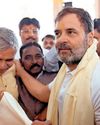
It was in Sunder Nagri, a resettlement colony in North East Delhi, that Arvind Kejriwal gave shape to the two objectives of his political career—taking on corruption and serving the urban poor. About two decades ago, in these congested lanes that he called his karmabhoomi (land of duty), Kejriwal launched an NGO called Parivartan that used the Right to Information Act to expose corruption in the lower levels of government.
He operated out of a one-room office in Sunder Nagri; there was minimal furniture and a small team of youngsters drawn mostly from the area. One of them was Santosh Koli, a chirpy girl who was knifed by the ration mafia in 2005, and who died in a road accident in 2013. Once, Kejriwal, with Koli, had taken a bunch of South Asian journalists—there as part of a UNDP workshop— around Sunder Nagri and enthusiastically briefed them about the work they were doing. It was about exposing corruption and giving the residents of the area the amenities they were entitled to.
Kejriwal had quit the Indian Revenue Service to become a transparency activist and was awarded the Magsaysay award in 2006 for his social work. Soon, he would put together what was to be independent India’s biggest people’s movement—the India Against Corruption campaign—which not only changed the course of politics in the country, but also paved the way for Kejriwal to become part of the system he was railing against.
What is ironic is that, now, the 55-year-old Delhi chief minister, who started his public life as an anti-corruption crusader, finds himself in judicial custody in a graft case. The Enforcement Directorate arrested him on March 21 in connection with alleged corruption in the framing and implementation of Delhi’s excise policy.
هذه القصة مأخوذة من طبعة April 14, 2024 من THE WEEK India.
ابدأ النسخة التجريبية المجانية من Magzter GOLD لمدة 7 أيام للوصول إلى آلاف القصص المتميزة المنسقة وأكثر من 9,000 مجلة وصحيفة.
بالفعل مشترك ? تسجيل الدخول
هذه القصة مأخوذة من طبعة April 14, 2024 من THE WEEK India.
ابدأ النسخة التجريبية المجانية من Magzter GOLD لمدة 7 أيام للوصول إلى آلاف القصص المتميزة المنسقة وأكثر من 9,000 مجلة وصحيفة.
بالفعل مشترك? تسجيل الدخول

Use multi-asset investing to overcome portfolio volatility
EQUITY MARKETS have been choppy during this year. After rallying for the better part of the first nine months of 2024, equities corrected sharply in October and November, before taking off once again on rally mode in December.

Twist of faith
Upamanyu Chatterjee is back with his wry sense of humour in his new novel, and most of it is directed at religion and spirituality

THE GLORY OF SARI
Saris of Memory weaves together history and textiles, highlighting key moments from the author's collection

We win together
We invented chess, which was pretty cool of us. The original game 'chaturanga'that is four divisions (infantry, cavalry, elephantry and chariotry)-was a war strategy game. When the game travelled to the Middle East, they mangled the Sanskrit and it ended up being called 'shatranj' instead.

BEATS THAT HEAL
Music ignites the light within us, says Grammy-winner Chandrika Tandon

Older, smarter, sexier
Those who worship him regardless of where he works have continued to do so. Such is the power of Alessandro Michele, that after being the face of some mega brands for 10 years (namely Gucci and now Valentino), he remains bigger than the labels themselves. His debut collection for Valentino was presented at the recent Paris Haute Couture Week, and it has been adored by his adorers.

The road to peace
Future political dialogues should explore means of ensuring a more robust autonomy to tribal communities

Diary of a Sherpa
Amitabh Kant's new book is a comprehensive account of the G20 Summit held in Delhi in 2023

The annoying orange
Everything is great. All is sunshine. I am an eternal optimist.\" It's the fad of our TikTok times everything is not great, the sun sets daily, nothing is eternal. If anything, everything is ephemeral, night brings darkness, and optimism often crumbles under the weight of history. British philosopher Roger Scruton warned: \"Hope untempered by the evidence of history is a dangerous asset, one that threatens not only those who embrace it, but all those within range of their illusions.\"

NO SEAT, YET UPBEAT
The Congress is buoyed by its increased vote share in Delhi, and feels it can push the AAP into further decline